Despite evidence to the contrary, much of it written by me, I am not a monster. Like virtually any human being, I have certainly been known to find dogs charming, but I am happy the building in which I live only allows cats because I would rather see my neighbors’ pets than hear them, and I prefer not to have one in my own home, so I can relate to George Newton (Charles Grodin), the hapless protagonist / antagonist of Beethoven. This would seem, at first glance, to be the ultimate dog lover movie, but it is arguably more enjoyable, and certainly more interesting, to view it from the opposite perspective.
The film stacks the deck against dog haters from the beginning, opening on an ominously rainy night outside the “Pet Supply” warehouse where evil Dr. Varnick (Dean Jones) conducts his nefarious experiments on innocent puppies. A prime example of this deck-stacking occurs later in the film, when it is revealed just what Dr. Varnick has in mind for poor Beethoven: a munitions manufacturer wants him to “test” a new type of exploding bullet, to see the impact it makes on “big skulls.” While it can be argued that animal testing is worthwhile because of the potential human benefits gained from it, even the most dyed-in-the-wool dog hater would find it difficult to defend the scientific expediency of shooting a dog right in the goddamn face.

Our introduction to the primary dog hater, the long-suffering George Newton, sums up the existential nightmare that is his life. As he is distracted by the routinely poor service of the hated paperboy, the evil puppy Beethoven sneaks into George’s home and endears itself to his family. Believing little Beethoven to be a surprise present from George, his ungrateful wife, Alice (Bonnie Hunt), and three children finally show him some appreciation, taking back everything they’ve ever said about him being “cold and calculating,” in the words of Alice. This appreciation is shallow and short-lived, of course, as George makes it plain that there has been some mistake and that he has no intention of keeping the dog, and his family goes right back to their former view of him as a heartless tyrant.
George’s reasons for not wanting a dog are perfectly reasonable, and he pleads his case nobly, to no avail: “If we keep it, the house will be destroyed.” He goes on to enumerate the myriad reasons canine companionship is less than ideal: “Dogs sniff, they lick, they chew, they drool, they scratch… they have parasites.” Finally, he makes his most eloquent case, outlining the nightmarish cycle of getting a dog, training it to the point where you can finally live in peace with it, only to watch it die, and then be forced to start all over again with a new one. However, all of George’s eloquence and logic are for naught when his traitorous children throw the old “You always say we need to learn about responsibility” back in his face.
When George finally relents and agrees to keep Beethoven, insisting that it’s only until they find his rightful owner, we see a montage of Beethoven winning the undying love and devotion of George’s terrible family, while simultaneously terrorizing George himself: he pisses in George’s briefcase, drools in and hides his shoes, stands on the kitchen table to drink from the goldfish bowl, eats the Thanksgiving turkey, forces George to take long walks in the rain, ruins his suit with muddy paw prints and, finally, comes in from the rain soaking wet with dirty water, which he shakes off all over George and his ruined bedroom. The final image of the montage is a splatter of rainwater and slimy drool covering a family portrait on the bedside table, a perfect symbol of the idyllic family life Beethoven is eagerly destroying at every opportunity.
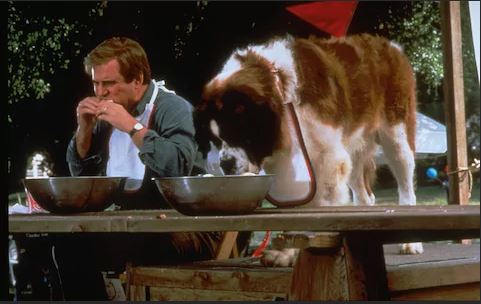
This montage also shows glimpses of the comically large amounts of food Beethoven requires, hinting at the astronomical financial burden incurred in order to keep this “wonderful” new addition to the family. Financial difficulties hover over the entire movie, but only George seems concerned about them. Alice, the only other presumably responsible adult in the family, continually shows resentment for George’s all-consuming focus on work, ignoring the fact that the family’s survival depends on that very work.
In the following scene, George attempts to express his financial worries to his uncaring family at the breakfast table, only to be interrupted by a far more pressing concern: “Beethoven wants you to scratch his head, Daddy.” While George’s pathetic ingrate of a son hits him up for money for karate lessons, Beethoven sneaks a piece of bacon from George’s plate and, when George gets angry about it, his awful children yell at him as if he is the bad guy. The beast is literally stealing food from his plate, and he’s just supposed to grin and bear it.
In the melee to try and get his bacon back, George has his hands and pants slimed by Beethoven’s incessant drooling, and is predictably given absolutely no sympathy from his family. His unheeded cry of “He’s slimy!” is one of despair, a plea for reason from a man in disbelief that his family loves this disgusting monster that is steadily ruining everything he holds dear. While he goes to change his pants, already behind schedule for an important meeting, Beethoven is no doubt being rewarded with the remainder of his breakfast. As George finally pulls out of his driveway, in a new suit untarnished by the vile secretions of the hideous canine interloper, Alice “accidentally” sprays him with the garden hose through his open car window, one of many hints throughout the movie that George’s family was already enough of an impediment to his sanity and well-being even before Beethoven came along.
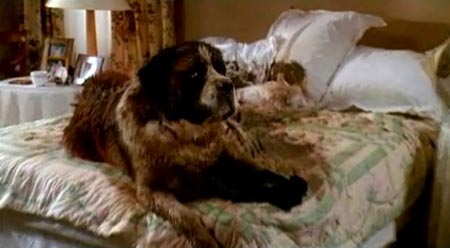
George’s potential business partners, Brad (David Duchovny) and Brie (Patricia Heaton), are a couple portrayed as horrible people because they’re the types who chose successful careers over the “blessings” of children and pets, further enforcing the film’s warped sense of family values over self-sufficiency and hard work. I found myself actually liking and relating to these characters, especially when George’s children ask them if they have kids and they respond by laughing right in their putrid little faces. It’s clear that they’re meant to seem sleazy and shallow, but all I could see was how hateful and judgmental Beethoven and the kids appeared, just sitting there silently judging their guests for their obviously superior lifestyle, free of the dirt and stench of children and pets.
In the aftermath of Beethoven ruining a lucrative financial deal George had been arranging with Brad and Brie (who are, of course, planning to rip him off because the script is rigged in favor of George’s family and their beloved monster-dog), George attempts to really open up to Alice (“I really don’t like our dog”), but she only snipes back about her distrust of Brad and Brie, who George has notably not invited to live with them rent-free. George is expressing his existential dilemma to her (this dog has ruined his life!) but she blows it off to gripe once again about the way George makes his living and provides for the family. This infuriating harpy refuses to go back to work and help out financially, yet she resents George for working hard to provide a better life for her and the kids.
“Everything was fine before Beethoven came into our lives,” George says during this argument, but it seems like something of which he is trying to convince himself. How fine was everything before Beethoven, really? If his wife and kids so readily throw him over in favor of the first smelly, slimy, disgusting canine that comes along, how good could their family life really have been up to that point? Perhaps George is, at heart, similar to Robert Dupea (Jack Nicholson) in Five Easy Pieces, a lifelong loner desperate to cut his ties and escape the soul-crushing banality of his horrible family; in a different type of film, the arrival of Beethoven could have been the final straw that forced him to take a stand and cast off his shackles.
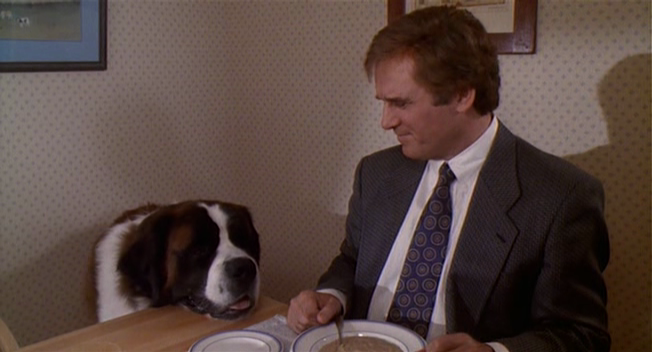
Alas, this is not that film, but the kids see the signs and, afraid that Daddy just might snap and kill the hated dog (and/or maybe themselves and Mommy, the true tormentors he has been forced to endure for so long), they step up to the plate and try to ease George’s burden by feeding and bathing the horrid beast. These are, of course, the chores they had agreed to as a condition of keeping Beethoven in the first place, and they were supposed to be keeping up with these duties all along, but George is a kind and patient man, and he shows appreciation for their pitiful efforts.
George even manages to come to a sort of understanding with the foul beast, who is now fenced in at night in the backyard… or so he thinks. Of course, Beethoven only sneaks out of his rightful imprisonment like the vicious cur that he is. In this particular case of Beethoven wantonly flouting the ancient roles of dog and man, he cuddles up in bed with George, who, exhausted from the constant demands of family and dog, believes it is Alice nuzzling him from behind. George begins to be physically aroused, ramping up the surreal nightmare that his life has now become. The dog practically rapes him in his own bed!
The rest of the family remains oblivious to the unending horror George is forced to endure, and they refuse to accept the threat to his sanity posed by the unwanted guest. They win out over his better judgment once again when they successfully make a case for Beethoven being allowed to roam the yard and house freely. This comes as a result of one extremely terrible babysitter who nearly allows the youngest child to drown before Beethoven comes to the rescue, yet another case of the movie stacking the deck of audience empathy in Beethoven’s favor. This is a desperate attempt by the screenwriters, John Hughes (under the pseudonym “Edmond Dantes”) and Amy Holden Jones, to appeal to the dog-loving crowd their film seeks to attract. It shows a cynical brilliance on their part that George is both the protagonist and antagonist of the film, and the events are carefully orchestrated to punish George for not embracing Beethoven and his parasitic kind.
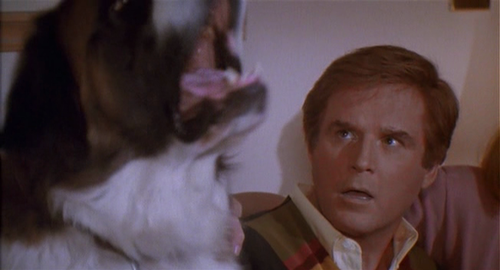
In the midst of all the apathy, contempt, and outright insubordination he receives from his family, is it any wonder George finds something of a kindred spirit in the evil Dr. Varnick? When Varnick visits George’s home posing as a veterinarian and asks him, “Have you noticed anything strange about your dog lately?” George immediately confides in him: “He’s destroyed my life! I wish I was kidding.” It’s as if the words have just been waiting for a sympathetic ear. One can almost imagine Beethoven as a prequel to itself, with George as a younger version of Dr. Varnick, a once happy man driven to the depths of depravity by the unforgiving curse of the worst pet the world has ever known.
Dr. Varnick grants George’s unspoken wish to be rid of Beethoven with a scheme to acquire the dog for himself by pretending to suffer an attack, thus branding Beethoven as violent and dangerous. Unfortunately, poor George cannot even enjoy the reprieve, because his worthless, ungrateful family manages to blame him even for this, when all evidence points to it being Beethoven’s own fault. George finds his family huddled together in the living room, crying over the removal of their beloved pest from the house, leaving George on the outside. His youngest child laments, “Daddy hates Beethoven! He’s always hated Beethoven!” What can George do? It’s true, he has always hated Beethoven, but only as any sane, rational man with even the slightest appreciation for his own quality of life would. In what should be his moment of triumph at finally ridding himself of the demonic beast, the long-suffering George only finds more grief. His perfectly understandable hatred of the monster that has ruined his life is tearing his family apart!
As if all this weren’t enough, a pivotal plot point is introduced when George takes Beethoven to the pound for extermination: they say they have to hold the dog overnight before it is scheduled to be euthanized in the morning and so… wait for it… they charge George a boarding fee! Even when the end of his nightmare seems to be in sight, he’s still getting financially soaked one last time, and then he gets home just in time to hear his youngest brat call him a “dog-killer” through a mouth full of crocodile tears. What did this fine, honorable man ever do to deserve such a horrible life?
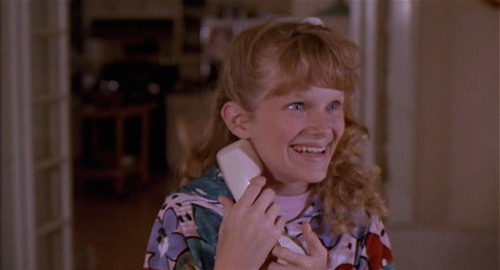
Up to this point, we have only seen George’s family show him any appreciation once, near the beginning of the movie, when they mistakenly believe he has gotten them a puppy. It is only in the third act that we see this insincere, fair-weather respect again, when George goes against his better nature and knocks out Dr. Varnick. The kids are duly impressed with this misplaced bravado, and even Alice, who has apparently been withholding her affections for so long George can be excited by a dog nuzzling him, says, “Really, hon, I’ve never found you more attractive.” Apparently, what this nagging shrew really wants is for George to quit his job in order to spend more time with the all-important family, then when they’re all homeless and living on the streets, she can get turned on watching him fight the other bums for old pizza crusts.
George finally gets a full redemption in the eyes of his ungrateful family when he helps them free the kidnapped stray dogs from Dr. Varnick’s warehouse. George can only achieve this dubious redemption by completely abandoning all his cherished principles and “temporarily” adopting a few dozen more dogs. Judging by the tenure of Beethoven’s own “temporary” adoption, George’s nightmare has only just begun.
In the aftermath of the great canine prison escape, a TV reporter puts George on the spot, and Grodin’s stellar performance betrays the insincerity behind George’s every response. “Beethoven isn’t just some dog who wandered in off the street,” he says, but this is exactly what Beethoven is, and George knows it better than anyone. “Have you always been a dog lover?” the reporter asks, and George takes a moment to consider the question. In this long pause, the soul-crushing weight of his endless suffering can be clearly read on his face. Finally, he heroically pushes back all that hurt and rage to reply, “Maybe not as much as now.”
The final shot of Beethoven illustrates the ultimate dog hater nightmare, as George goes to sleep surrounded by the literally dozens of dogs with whom he is now forced to share his hard-earned home. This is what he must endure for the love and appreciation of his family, and the preceding scene, described above, is only the third (and final) time this ersatz appreciation is displayed, as George’s family beams at him while watching his patently insincere profession of love for dogs. Beethoven is quite possibly the darkest movie in the 1990s family film canon.